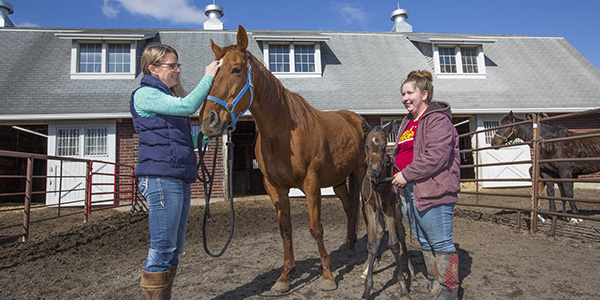
Taking the reins
Story by Ed Adcock
Image by Christopher Gannon
If you ask Nicole Ferwerda, students are the workhorses of Iowa State’s equine facilities.
“It’s me and them,” she says. Ferwerda is an animal science lecturer who manages the student workers. “They are the ones who feed, clean stalls and treat horses that require medication.”
Up to 15 students work at the Horse Barn on main campus and the Equine Learning Center south of campus on Mortensen Road.
Iowa State maintains a herd of Quarter Horse and Thoroughbred broodmares used for teaching and demonstrations. As many as 80 horses are cared for by Iowa State, and the Department of Animal Science offers 10 undergraduate and graduate courses in equine science.
“About 20 percent, or more than 200, of the animal science student body has an equine focus,” Ferwerda says. “Students gain valuable experience in the general care, breeding, foaling, early training and marketing of the university’s horses.”
In addition, the university offers breeding services to the public. Foals produced by the farm are sold privately or in public auctions.
In 2004, the American Quarter Horse Association recognized Iowa State with the Legacy Award for breeding Quarter Horses for 50 consecutive years.
Andy Riehl, a senior in animal ecology, doesn’t just work at the Horse Barn, he lives there. The historic barn, built in 1923, includes two student apartments, an of ce, a reproduction lab, equine treadmill and a classroom.
Riehl does a variety of chores, from cleaning sheds, power washing, sanitizing the foaling area, maintaining the facility and moving manure.
“Overall it has been an excellent experience. I’ve seen more sunrises then I care to count working this job and watching them makes a great start to every day,” he says.
Ferwerda says students taking classes also get involved. A class handles the overnight foal watch. Other classes are responsible for training young horses or preparing yearlings for sales or events. And, reproduction lab students monitor pregnant mares.
Ferwerda teaches those classes, two to four a semester, and advises about 35 undergrads.
“Ever since graduating, I’ve really focused on horses. I’m lucky I get to teach classes speci c to the horse,” she says. “I grew up with horses, and started learning about them in 4-H.”
The Nebraska native got her bachelor’s degree in animal science from the University of Nebraska in Lincoln and a master’s degree in equine reproductive physiology from Missouri State University. She joined Iowa State in 2007 after managing the horse farm at Texas A&M University.
Many of the student workers have a background with horses but very few have handled mares, foals and stallions before working at the Iowa State Horse Farm.
Ashlyn Grogan, an animal science senior, grew up riding horses and says she gained considerable experience working at the Horse Barn.
“I have learned a lot through Nikki’s classes, but being able to stay after classes and assist her is how I have really been able to gain hands-on experience” Grogan says. “It has made me much more con dent talking to equine industry professionals.”



